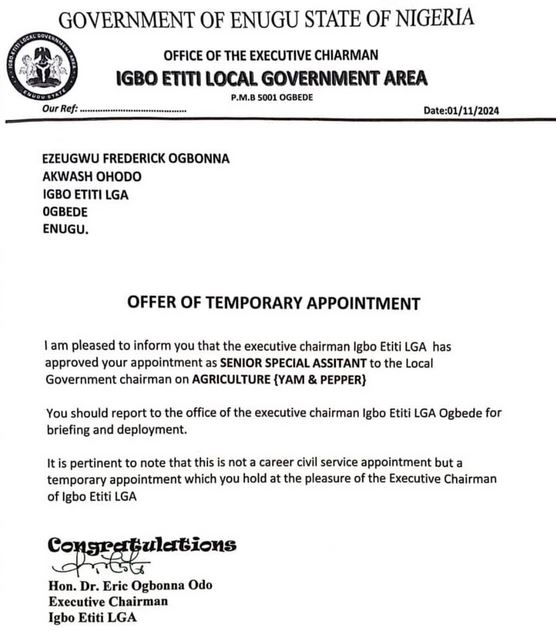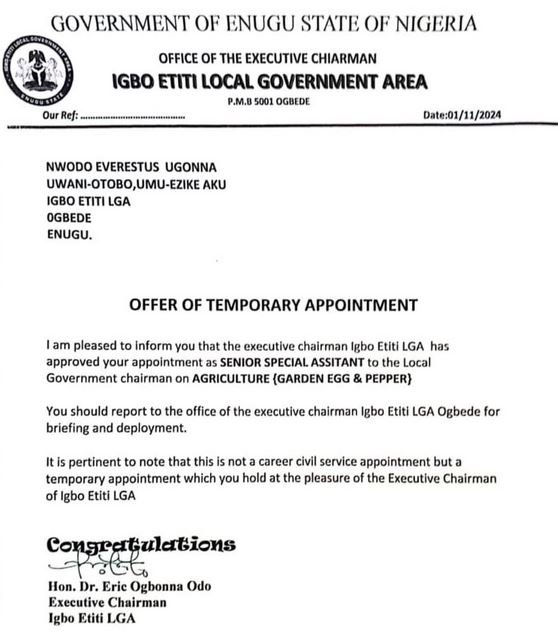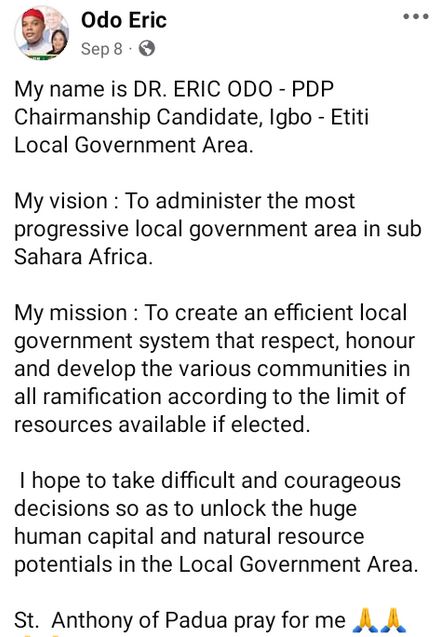AFOLABI
Enugu LG Chairman Appoints Special Assistants On "Pepper, Garden Egg And Yam"
Hon. Dr. Eric Ogbonna Odo, the Executive Chairman of Igbo Etiti Local Government Area of Enugu State, has announced the appointment of two Senior Special Assistants on garden egg, pepper and yam.
According to the appointment letters making the rounds on social media, Odo appointed Ezeugwu Frederick Ogbonna, as an SSA on Yam and Pepper.
He also appointed Nwodo Everestus Ugonna as SSA on Garden Egg and Pepper.
“I am pleased to inform you that the executive chairman Igbo Etiti LGA has approved your appointment as SENIOR SPECIAL ASSISTANT to the Local Government chairman on AGRICULTURE (GARDEN EGG & PEPPER),” Nwodo’s appointment letter partly read.
“I am pleased to inform you that the executive chairman Igbo Etiti LGA has approved your appointment as SENIOR SPECIAL ASSISTANT to the Local Government chairman on AGRICULTURE (YAM & PEPPER),” Ezeugwu's letter reads.
Meanwhile, in Odo's mission statement, he pledged to administer the "most progressive local government area in sub Saharan Africa."
“My vision : To administer the most progressive local government area in sub Saharan Africa. My mission : To create an efficient local government system that respects, honour and develop the various communities in all ramifications according to the limit of resources available if elected,” the statement read.
“I hope to take difficult and courageous decisions so as to unlock the huge human capital and natural resource potentials in the Local Government Area.”
LCCI to FG: N1,400 FX rate projection in proposed 2025 budget unrealistic
The Lagos Chamber of Commerce and Industry (LCCI) says the N1,400 foreign exchange rate (FX) projection in the proposed 2025 budget is unrealistic.
On Tuesday, the federal government proposed N47.9 trillion as the total expenditure for the 2025 budget.
The budget parameters include a crude oil price benchmark of $75 per barrel and an oil production target of 2.06 million barrels per day (bpd).
The federal government also projected the exchange rate to drop to N1,400 per dollar and a gross domestic product (GDP) growth rate of 4.6 percent.
In a statement on Monday, Chinyere Almona, the LCCI director-general, advised the government to reassess the assumptions for the 2025 budget due to the challenges posed by high inflation and the exchange rate.
Almona said inflation, which rose to 33.88 percent as of October 2024, makes it unrealistic to expect a steep 51 percent drop within a year.
“The approved 2025 – 2027 MTEF proposed that the federal government will spend N47.9 trillion to run the economy in 2025. This represents an increase of 36.64% in government expenditure compared to N35.06 trillion in 2024,” the statement reads.
“In nominal terms, the budget is the highest in the history of the country in Naira denomination. The proposed 2025 budget aggregates are inherently sensitive to current macroeconomic conditions, as they directly impact revenue generation, expenditure, and overall fiscal performance.
“A review of the key parameters and assumptions on which the 2025 budget is being proposed appears to be too optimistic in the face of current realities as recorded in the economic and social indicators.
“Particularly, the assumption of an exchange rate at N1,400 is too fragile to work with against the current average of above N1,600 to a Dollar in both the official and parallel markets.
“Assuming an inflation rate at 15.8 percent does not reflect the unabating factors pushing up both the headline and food inflation. With inflation rising to 33.88 percent as of October 2024, it is unrealistic to assume a steep 51 percent crash within a year.
“Since the current challenging economic conditions are mostly fueled by the inflation rate and the exchange rate, we advise the government to reconsider the apparently over-ambitious assumptions for the 2025 federal budget.”
‘CLARITY OF POLICY DIRECTION CRITICAL TO ACHIEVING PROJECTED 2025 GDP GROWTH RATE’
Almona said beyond the assumptions and projections, the creation of an enabling environment for the private sector to thrive, and the clarity of policy direction in the economy are critical to achieving the projected growth rate of Nigeria’s gross domestic product (GDP) in 2025.
“Further breakdown indicates that debt services are proposed to increase by 91.2% to N15.38 trillion, which is equivalent to 32.1% of the total budget. This appears to be unsustainable,” the LCCI president said.
“The situation is further worsened with the projected deficit at N13.08 trillion and new borrowings of N9.22 trillion.”
Almona advised the federal government to maintain fiscal discipline by adhering to the fiscal responsibility Act in budget management and borrowing.
‘CBN SHOULD SUSTAIN WAYS AND MEANS ADVANCES AT 5% FOR 2024-2025 FISCAL YEARS’
“With federal government debt already at about N134 trillion as of June 2024, inflation reaching a new high of 33.88 percent as of October, and businesses burdened with a high Monetary Policy Rate at 27.25 percent, the Federal Government has a narrow bridge to navigate choices of policy options,” she said.
“We urge the Central Bank of Nigeria to sustain its Ways and Means Advances to the Federal Government at a five percent limit for the fiscal years 2024-2025.
“Non-oil revenues, such as taxes, customs duties, and surpluses from government agencies, are all subject to volatility in the economy.
“Current economic downturns, tense business environment, ongoing debates on tax policies, and shifts in consumer behaviour can impact non-oil revenue performance.
“In the face of current realities, we urge the government at all levels to be more proactive in respect of nature-induced casualties, climate change impacts, and damages caused by human activities.
“In recent months we have recorded massive destruction of lives and properties due to Climate-related factors. We therefore expect the legislative arms at all levels of government to appropriate more funds to tackle climate change adaptation and mitigation nationwide.
“We need to focus on sectors that have shown resilience and relevance and are key drivers of current economic indicators like inflation, exchange rate, unemployment, and interest rates.”
The LCCI DG also recommended increased investment in food production, including crops, livestock, fisheries, and poultry; improving power supply, addressing insecurity, and ensuring a stable policy and regulatory environment.
Almona emphasised the need for coordinated monetary and fiscal policies in critical areas, reducing youth unemployment through skills acquisition, and empowering small and medium-sized enterprises.
Hardship: 99% Of Nigerians Are Going Through Hell - Music Executive, Paulo Shares Observation
Nigerian music exec, Paul Okoye has spoken about the economic hardship in the country.
Taking to Instagram, he said that almost all Nigerians are going through "hell" while few others are okay financially.
He wrote: "Right now, 99% of Nigerians are going through hell at the moment, while only 1% flaunt their wealth, oblivious to the struggles."
He went on to encourage the 99 percent who are struggling, urging them to keep pushing.
See Post Below;
Nigeria ranks 7th for international students in the US — 13.5% rise from 2023
More students of Nigerian descent enrolled in higher institutions in the United States in the 2023/2024 academic year.
According to the 2024 Open Doors report on international education exchange, Nigeria was the seventh largest source of international students globally and the highest in Africa, with 20,029 enrollees.
The enrolment figures for Nigeria amounted to a 13.5 percent increase from the previous year for the West African nation.
The report published on Monday, was compiled by the US department of state, bureau of educational and cultural affairs, and the institute of international education.
Findings showed that the US saw a total intake of 1,126,690 foreign students in 2024 — an all-time high for international enrolment.
“Nigerian students bring a wealth of diversity, perspectives, and academic excellence to U.S. universities, enriching the educational experience for all students,” a statement from the US consulate in Nigeria reads.
The consulate said Nigerian scholars are known for their strong academic backgrounds and commitment to advanced education, with over 55 percent pursuing graduate-level studies in the US.
The statement added that the rise in Nigerian students reflects US commitment to quality education.
“It also highlights the importance of people-to-people connections that deepen understanding and strengthen bonds between Nigeria and the United States,” the consulate said.
INDIA OVERTAKES CHINA
For the first time since 2009, India overtook China on the ranking, with 331,602 Indian students pursuing higher education in the US, a 35 percent increase from the previous year.
Despite a four percent decline in students, China was the second leading country of origin and remained the “top-sending country” for undergraduates and non-degree students.
In Africa, Ghana recorded the largest percentage increase of 45 percent.
Other countries on the list include South Korea, Vietnam, Bangladesh, Canada, Taiwan, Nepal, and Brazil.
The rise in foreign students enrolment in the US comes amid visa restrictions in the United Kingdom, Canada, and Australia.
However, analysts worry that Donald Trump’s recent appointment of Stephen Miller as incoming deputy chief of staff for policy, could pose significant challenges for prospective international students.
Miller worked in the first Trump administration as a senior adviser and is famed for his extremist rhetoric on immigration.
President-elect Trump has also consistently taken a hardline stance on immigration, advocating stricter policies and reduced pathways for immigrants.
Gunmen ‘abduct youth corps member’ in Niger state
Gunmen have reportedly abducted one Chiamaka Obi, a National Youth Service Corp (NYSC) member, along Niger-Onitsha expressway in Niger state.
Obi, who is from Edenta in Okwu Etiti, Orsu LGA of Imo state, was said to have been kidnapped on Monday while returning from Kebbi state after the completion of her youth service.
The corp member was said to have been abducted alongside a family of four, the bus driver and three other passengers.
Reacting to the incident on Tuesday, Uche Agabige, a member of the Imo state house of assembly, said the abductors are demanding for a ”outrageous” ransom for her release.
Agabige expressed concern over Obi’s safety, while urging the Imo state government to launch an investigation into her abduction in order to apprehend the perpetrators.
The lawmaker also called on President Bola Tinubu to address the rising cases of kidnapping and banditry in Nigeria.
“Miss Chiamaka Linda Obi is from Edenta in Okwu Etiti autonomous community in Orsu local government council area where I represent at the State Assembly. She was returning home on Monday after completing her NYSC when she was kidnapped,” Agabige said.
“The kidnappers have demanded an outrageous ransom for her release. So, I call on government to intervene and ensure the victim is freed without being harmed.”
Henry Okoye, the state’s police spokesperson, was not available for comments on the incident as his phone numbers were unreachable as at the time of writing this report.
Osun Park Manager, Alowonle, Arrested Over Alleged Possession Of Police Ammunition
The Anti-Kidnapping Unit of the Osun State Police Command reportedly arrested the head of the Osun State Park Management System, Wakeel Nurudeen, popularly known as Alowonle, on Monday night.
Alowanle was allegedly found in possession of police-issued arms and ammunition.
His arrest is also linked to the alleged killing of one Oyewale in 2022 and the assault of several residents in the state.
According to a reliable security source, he was apprehended at the Ring Road area of Osogbo while allegedly attempting to attack a resident who had filed a petition against him.
Reports indicate that Alowonle and his associates arrived at the scene in a Previa bus with registration number RBC 275XK.
However, a distress call alerted the police, leading to his arrest.
The source continued: “Police reinforced and he was rearrested at Susi area of Oke-Baale, Osogbo alongside eight others. They were taken to the Osun State Command.”
A police source disclosed that “during the arrest, a Barrett pistol and six rounds of 9mm live ammunition and one expended empty shell were recovered from Alowonle’s private Toyota Highlander unregistered jeep.”
“When he attempted escaping again, he was maimed by police shot.”
It was gathered that a Hummer bus with Reg No. AWK 480YD, Nissan Almera unregistered and Toyota Sienna with Reg no. GNN 595 XD were also reportedly recovered from him.
The source stated that he had been taken to a hospital for treatment.
The Osun Police Command spokesperson, Yemisi Opalola has not yet responded to news of the arrest as she did not pick up calls and text messages sent to her.
EFCC Dismisses Two Staff Over Alleged Corruption
The Economic and Financial Crimes Commission (EFCC) has dismissed two employees due to corruption allegations.
Naija News reports that the Commission’s Chairman, Ola Olukoyede, announced this at the commencement of the 6th Annual Criminal Law Review Conference, organized by the Rule of Law Development Foundation in Abuja.
Olukoyede revealed that the dismissals occurred two weeks prior and emphasized that, in addition to being dismissed, any employees found to be in violation of the law will face prosecution moving forward.
“So many other reforms are going on, the issue of our staff and all of that.
“Just two weeks ago, I caused the dismissal of two staff members. You can’t be fighting corruption, and your hands are dirty. He who comes to equity, your hands must also be clean.
“And I say I will not only be dismissing them, I will also be prosecuting them because that is what we prosecute others for.
“So you will see that; we are preparing the case files of some of the people we have dismissed,” he stated.
The head of the EFCC stated that he underwent a two-year investigation during his tenure as the EFCC secretary, emphasizing that integrity is essential for survival, particularly among legal professionals.
He also mentioned that he had issued a standing directive stipulating that no prosecution should exceed a 15-count charge.
Tinubu reorganises media team, says no individual spokesperson
President Bola Tinubu has re-designated the positions of two recently appointed officials in the State House media and communications team to “enhance efficiency within the government’s communication machinery”.
In a statement on Monday night, Bayo Onanuga said Sunday Dare, the special adviser on public communication and national orientation, is now the special adviser on media and public communications.
Onanuga added that Daniel Bwala, announced last week as a special adviser on media and public communication, will now function as the special adviser on policy communication.
“These appointments, along with the existing role of special adviser, information and strategy, underscore that there is no single individual spokesperson for the presidency,” the statement reads.
“Instead, all three special advisers will collectively serve as spokespersons for the government.
“This approach aims to ensure effective and consistent communication of government policies, decisions, and engagements.”
There had been some confusion as Onanuga, designated as special adviser on communication and strategy, had been the presidential spokesman since the exit of Ngelale Ajuri, who was special adviser on media and publicity.
However, on Monday, Bwala announced himself as the presidential spokesperson.
“Today, I resumed officially as the Special Adviser, Media and Public Communications/Spokesperson (State House). I am happy to have joined a meeting of the robust and fantastic communication team of Mr. President. I love the existing unity among the team and hope we can leverage on that even for more synergy,” he wrote on his X handle.
British investors concerned about harmful business practices in Nigeria - says UK government official
Simon Manley, the UK’s permanent representative to the World Trade Organization (WTO) and United Nations (UN) in Geneva, says British investors in Nigeria have expressed worries over harmful business practices in the country.
Speaking during Nigeria’s trade policy review in Geneva, Manley said British investors in Nigeria are also worried about the involvement of state-owned enterprises in market-distorting practices.
The British government official welcomed Nigeria’s efforts “on challenging, but necessary, economic reforms”.
“In particular, we have been pleased to see the work done to improve the monetary policy environment and the removal of fuel subsidies,” Manley said.
“However, to be honest Permanent Secretary, we would like you to go even further and faster. For example, there are concerns around the impact of state-owned enterprises on the business environment.
“As the Secretariat noted in its report, as of 2022 around 40 state-owned enterprises were operating in key sectors like energy.
“These state-owned enterprises, to be honest, often employ market-distorting practices and benefit from unfair competition in our view.
“Other concerns that British businesses investing in Nigeria have raised include examples of harmful subsidies, forced technology transfer, discriminatory enforcement of competition policy, and complex regulatory barriers.
“And we have indeed picked up on some of those issues and concerns in our Advanced Written Questions.
“So we would encourage our Nigerian colleagues to address these harmful practices in order to boost investment, boost trade, improve its business environment and ultimately increase Nigerian prosperity.”
‘THE AFRICAN CONTINENTAL FREE TRADE AGREEMENT ALREADY BENEFITTING NIGERIA’
Manley said the African Continental Free Trade Agreement (AfCFTA) is already benefiting Nigeria’s economy and business environment.
For future growth, he said they are looking forward to Nigeria implementing the digital trade protocol of the AfCFTA.
“We congratulate Nigeria on commencing commercially meaningful trade under the Agreement by joining the Guided Trade Initiative on 16 July,” he said.
“We, in the UK, are proud to have supported the Nigeria AfCFTA Coordination Office on reaching this milestone and we are currently supporting the implementation of the Digital Trade Protocol flowing from the Agreement, which is an ambitious and comprehensive framework designed to facilitate digital trade and unlock the potential of the digital economy right across the continent.
“According to the joint World Bank-WTO Policy Note last year on digital trade in Africa, if African countries were to improve their digital regulatory environment to that of the best on the continent, trade costs could fall by 17% in goods and 25% in business and professional services.
“So, we look forward to Nigeria implementing that Digital Trade Protocol to the benefit of its businesses, its consumers, and its future growth.”
As a co-chair of the informal working group on gender, Manley also lauded Nigeria’s commitment to empowering women economically.
“As a little practical example, I was delighted to hear the recent story of Madam Chinwe Izenwa. A 73-year-old female entrepreneur and CEO of LeLook, a bags and fashion accessories company, who was the first Nigerian, I understand, to use the AfCFTA’s Guided Trade Initiative,” he said.
“She has even given herself the nickname 0001, as she holds the first Agreement certificate of origin.
“An excellent example of Nigeria’s action on women’s economic empowerment, delivering real-world benefits.”
Manley commended Nigeria’s proactive engagement in the WTO, describing the country as a friend to the multilateral system.
Acknowledging the leadership Ngozi Okonjo-Iweala, the WTO director-general, he described her as the organisation’s most renowned Nigerian.
‘NIGERIA HAS BEEN A STRONG ALLY IN PLURI-LATERAL NEGOTIATIONS’
Manley also commended Adamu Abdulhamid, chair of the WTO trade policy committee, for his significant contributions.
He stated that the organisation would particularly acknowledge Nigeria’s efforts in dispute settlement, as the focal point for the African Group, and in fisheries.
“Nigeria has been a strong ally in pluri-lateral negotiations, whether on Services Domestic Regulation, Investment Facilitation for Development and e-commerce,” he said.
“While we may not always see eye to eye, Nigeria has, rightly, kept our feet to the fire in ensuring that those pluri-lateral outcomes are balanced for all Members.
“Thanks to Nigeria’s input, we can be confident that the agreements reached are a fair compromise of ambition, commercial value and inclusivity.
“We were glad to have reached a stabilised text on e-commerce this summer. We welcome your confirmation, Permanent Secretary, this morning that consultations are ongoing back in Nigeria and we hope to count you as one of the Agreement’s founding parties as we move swiftly forward towards legal incorporation.”
Manley encouraged Nigeria to continue its reform efforts, adding that “Only the things for which you have struggled will last”.
Wizkid unveils tracklist for new album ‘Morayo’
Wizkid, the Grammy-winning Nigerian singer, has unveiled the tracklist for his upcoming album ‘Morayo’.
The highly anticipated project, scheduled for November 22, is a tribute to Jane Dolapo Balogun, Wizkid’s late mother, who passed away in August 2023.
In the tracklist, released on Monday, the singer features artistes like Asake, Brent Faiyaz, Jazmine Sullivan, Anaïs, and Tiakola.
The album comprises 16 tracks including, ‘Troubled Mind’, ‘Karamo’, ‘Kese (Dance)’, ‘Bad Girl’, ‘Time’, ‘Piece of My Heart’, ‘Break Me Down’, ‘Bend’, and ‘A Million Blessings’.
Others are ‘Après Minuit’, ‘Bad for You’, ‘Soji’, ‘Don’t Care’, ‘Slow’, ‘Lose’, and ‘Pray’.
Earlier this year, Wizkid made it clear that ‘Morayo’ is not an Afrobeats project and urged fans of the genre to avoid downloading it.
Born Ayodeji Balogun, Wizkid gained prominence in 2011 when he released his debut album ‘Superstar’.
He has released four additional albums including, ‘Ayo’ in 2014, ‘Sound From The Other Side’ in 2017, ‘Made In Lagos’ in 2020, and ‘More Love, Less Ego’ in 2022.
The singer has also received numerous recognitions, including a Grammy Award in 2021 for his collaboration with Beyoncé on the hit song ‘Brown Skin Girl’.
In October, ‘Made in Lagos’ was recognised as the most-streamed Nigerian album on Apple Music














